Report on International Exchange Program with the University of Oslo
As part of “Multi-scale and multi-method assessment of rapid glacier and ice sheet changes in the Arctic” (Coordinator: Shin Sugiyama, Hokkaido University), one of the selected themes for the International Research Exchange Program of Priority Subject 1, the Glacier and Ice Sheet Group of the Institute of Low Temperature Science at Hokkaido University and the Glacier Research Group of the Department of Geosciences at the University of Oslo collaborate on a variety of activities, including the exchange of researchers and graduate students, joint glacier observations, international workshops, and special lectures, practical training and exercises.
Table of Contents
Glacier observation and hot-water drilling at Kongsvegen, Svalbard(2024/9/9)New!
Fieldwork on Kongsvegen, Svalbard (April 12 – May 1, 2024)(2024/7/3)
Cryosphere Modelling Course in Sapporo(2024/6/30)
Research visit at the University of Oslo in February-March 2024 (2)(2024/4/11)
Research visit at the University of Oslo in February-March 2024 (1)(2024/4/11)
Research visit at the University of Oslo(2023/2/17)
Research workshop of ECRs at the University of Oslo(2023/2/9)
Snow and ice field course in Moshiri, northern Hokkaido(2023/1/21)
Research workshop of ECRs from Hokkaido University and the University of Oslo(2023/1/21)
Glacier observation and hot-water drilling at Kongsvegen, Svalbard
Writer:Shuntaro Hata (Hokkaido University)
We joined a field campaign at Kongsvegen Glacier, Svalbard on 8-20 August 2024. The campaign was a part of MAMMAMIA project by Oslo University and ArCS II International Research Exchange Program. The objective of the project is clarifying the mechanism of glacier acceleration, which drives glacier mass loss. The main observation of this campaign was hot-water drilling. The total members were 7 people: Hata and Prof. Sugiyama (Hokkaido University), Prof. Thoams V. Schuler, Mr. John Hult, Ms. Maiken Revheim, and Ms. Satu Innanen (Oslo University; UiO), and Ingrid Kjerstad from Norwegian Polar Institute (NPI).
We arrived at Ny-Ålesund on 8 August, after meeting the members from UiO at Oslo Airport and transit at Longyearbyen. We took several days for preparation of field trip in Ny-Ålesund; a lecture about polar bear, test of instruments, and preparation of field equipment. There are scientific stations from several countries including Japan. I was surprised so many scientists were active there during our stay. We also met other team from Japanese scientists.
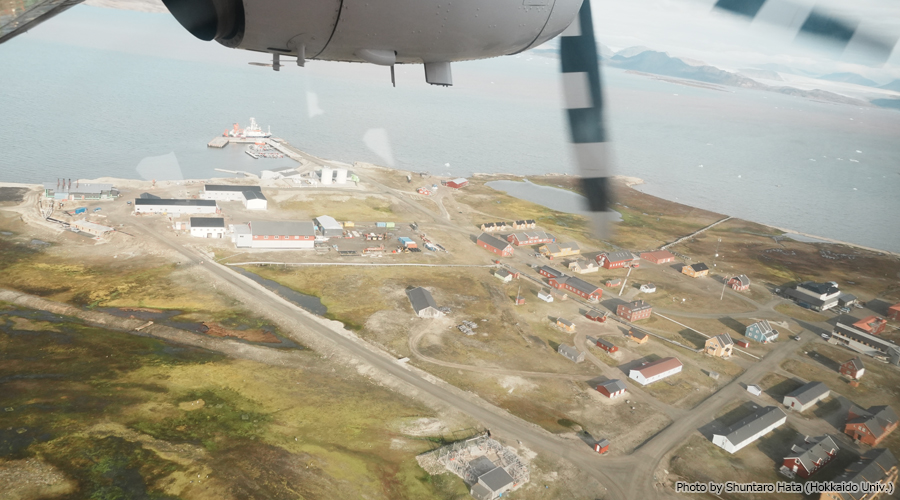
The field work started on 12 August, with a helicopter. During several round trips for material transport by helicopter, small parties went for collecting and maintenance of instruments, and data download. I collected time lapse camera and acoustic sensor (T. Imazu installed in April this year), and finished UAV flight. After meeting at camp on the glacier and one night, we moved to hot-water drilling. Automatic drilling system gradually drilled into the ice, we reached the 361 m deep glacier bed after 8 hours drilling. To get information of subglacial environments which is quite important for glacier flow, we carried out the borehole camera observation. Thereafter, we completed the acoustic sensing, and instrumentation at the bottom. Surprisingly, our staying on the glacier is only three days, I felt overwhelming of the short-term concentration.
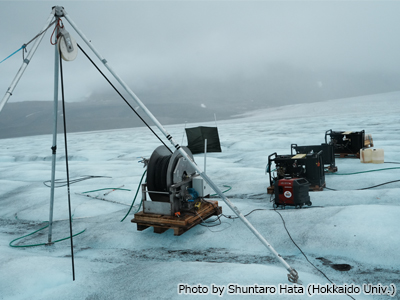
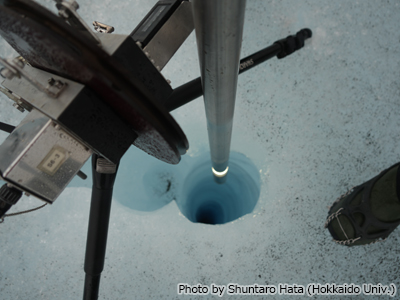
I now relieved that all planned observation finished despite the challenging glacier observation at Svalbard, which is first time visit for me. I am very glad to finish this campaign because me, Maiken and Satu experienced support for exchange program from ArCS II. I hope such joint observation will continue.
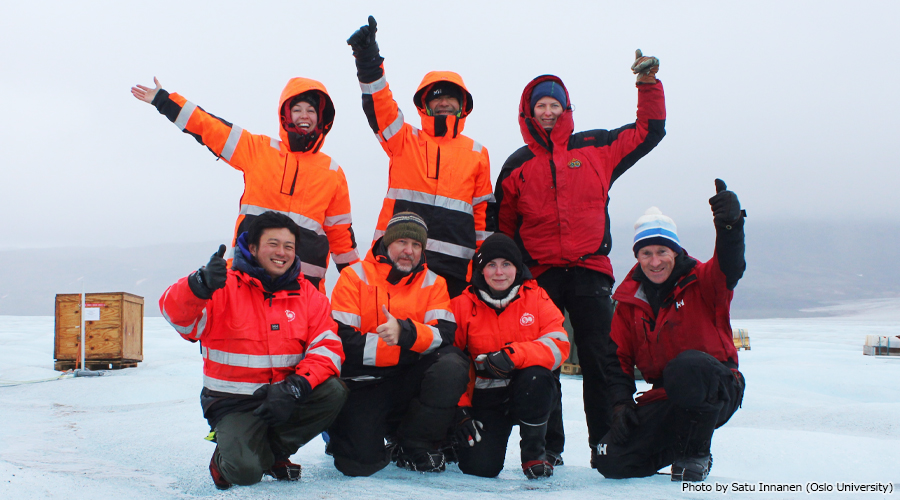
(2024/09/09)
Fieldwork on Kongsvegen, Svalbard (April 12 – May 1, 2024)
Writer:Takuro Imazu (Hokkaido University)
I joined a field campaign performed on Kongsvegen, a tidewater glacier near Ny-Ålesund in Svalbard, from 15 – 29 April 2024 as a part of the MAMMAMIA project of the University of Oslo and the ArCS II International Research Exchange Program. The project studies the mechanism of ice acceleration that significantly influences glacier mass loss, using various methods such as remote sensing, Global Navigation Satellite System (GNSS) survey, seismic monitoring, and numerical modeling. This time, we mainly worked on the maintenance of the equipment for the GNSS and seismic monitoring instruments in this fieldwork.
The members of the campaign were Prof. Thomas Schuler (University of Oslo), Dr. John Hult (University of Oslo technician), Dr. Maiken Revheim (University of Oslo PhD student), and the author, who was only one participant from Japan. I left Japan on 12 April and connected flights at Oslo to join the team on 14 April at Longyearbyen in the Svalbard archipelago (Fig. 1). I remember that the cold temperature of 10 degrees below zero upon our arrival made me anxious about subsequent observations. After one night in Longyearbyen, we finally flew to Ny-Ålesund, the observation base. During our stay, we mainly used the facilities of the Norwegian Polar Institute (NPI) (Fig. 2). Many researchers also used this facility, and we enjoyed coffee breaks with them before and after meals.
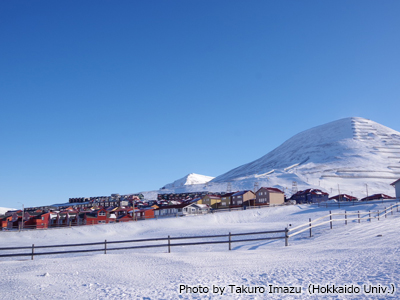
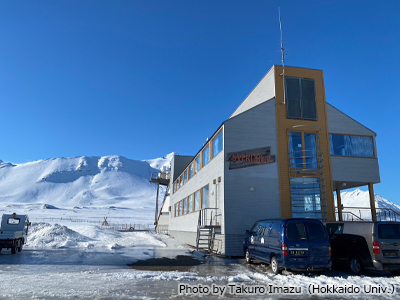
The first observation was on 17 April, when we used a snowmobile to visit Kongsvegen situated about 20 km from Ny-Ålesund (Fig. 3). Measurement data were downloaded and instruments were retrieved that day (Fig. 4). I was really surprised that the instruments were quickly repaired at NPI despite the remoteness in a polar region. Due to bad weather, the opportunities for observations after 19 April were only five times, but I was able to install my own instruments near a glacial lake. I am looking forward to the measurements, which will be collected in the summer of 2024.
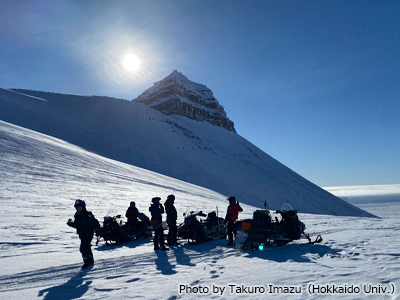
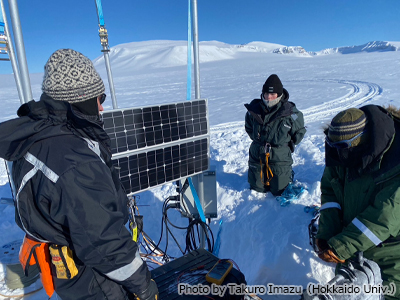
Although it was an unfamiliar environment for me, I was able to enjoy the experience for two weeks because the team members and NPI researchers welcomed me with open arms. The experience gained from this field activity and the interaction with many foreign researchers should help my future work. I hope to revisit the glacier with the team members.
(2024/07/03)
Cryosphere Modelling Course in Sapporo
Writer:Shin Sugiyama (Hokkaido University)
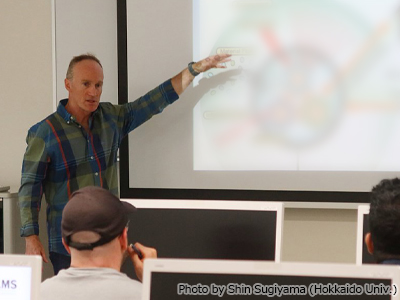
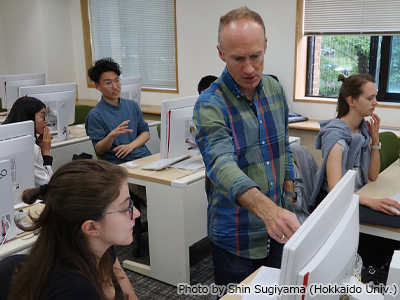
From 3 to 14 June 2024, “Cryosphere Modeling Course” was organized at Hokkaido University in collaboration with the University of Oslo. This program offers graduate students an opportunity to learn from basics to applications of numerical modeling on the physical processes in the cryosphere. The course is an official program of the University of Oslo. Previously, graduate students from Hokkaido University attended the course in Oslo and the course took place in Hokkaido University in 2018. This year, the course was organized under the ArCS II International Research Exchange Program between Hokkaido University and the University Oslo, as well as a program of Hokkaido Summer Institute of Hokkaido University which is open to students all over the world.
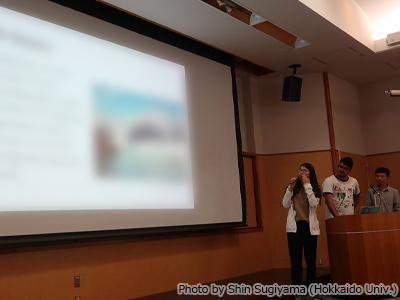
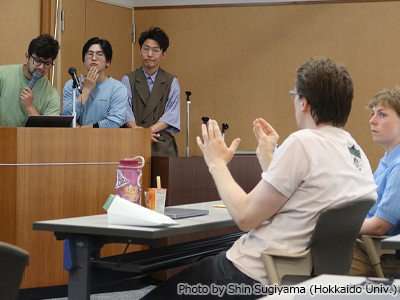
In addition to five students from Sapporo and three students from Oslo, six students from UK, US, France, Australia were joined the course this year. Beautiful spring fresh green as a background, the participants learned the background of the subject, theory and numerical scheme of numerical experiments on glaciers, ice sheets and permafrost. The intensive program for two weeks was completed by student presentations on their own simulation projects. Sharing time with colleagues from all over the world was a great experience, which should have an important influence on the future of the young researchers.
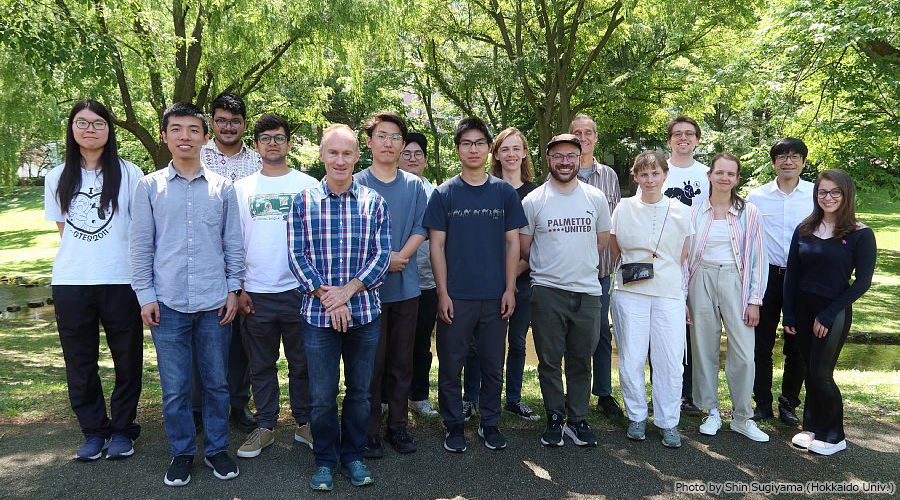
(2024/06/30)
Research visit at the University of Oslo in February-March 2024 (2)
Writer:Arlec Chang (Hokkaido University)
Soratakato Yamada (Hokkaido University)
Takuro Imazu (Hokkaido University)
For the rest of our stay, apart from working on our own in the room, we also made appointments with professors who could give insights into our issues and future work. Additionally, the research group have a Drone Lab on their second floor, which is looked after by a UAV technician. Similar to our cohort that the UAV is applied in surveys on Qaanaaq Glacier, Greenland, most people there rely on the sensors attached to the UAVs to aid their projects. Thus, many of them are experienced UAV operators and have a full set of expertise in terms of processing the drone data, which we were able to discuss on.
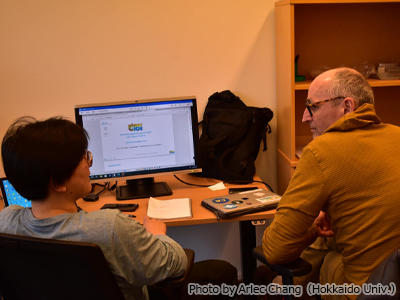
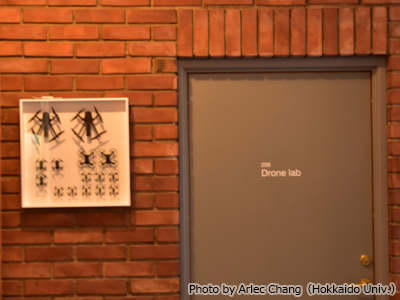
We also dropped by PhD students’ rooms to learn about their projects, or simply get to know the people involved in general. The lunch time and coffee break were great opportunities to talk with others too, from which we were able to meet other visiting master’s students and PhD students who were focusing on various research fields (snow melt and water resources, modelling of Scandinavia Ice Sheet, glacial geomorphology, thermal modelling of permafrost in Mongolia). We were also invited to attend regular seminars on Friday, where they usually have a presenter giving talk on latest progress.
Oslo is a diverse city with people from a variety of countries and regions. While we were heading to the university or dropping by a supermarket to purchase ingredients for dinners, we would hear different kinds of languages including Norwegian, English, German, French, and so on. However, English is the lingua franca and there was a massive opportunity to practice and improve our listening and speaking skills, both at campus and in the city.
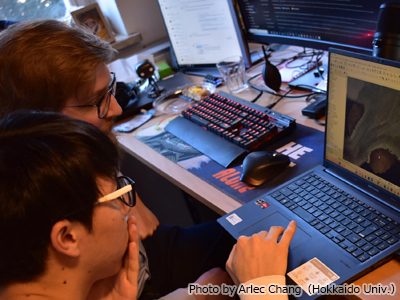
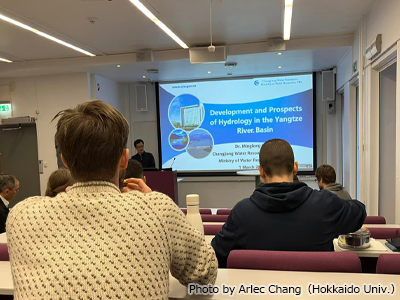
For most of us, this exchange program was our very first opportunity to stay at an overseas institution and discuss with people from another research group. Although it was unfortunate that we were not able to meet some researchers who could potentially aid more to our research, the positives we obtained from this visit definitely outweigh the unlucks, and we would like to build our future career from it.
(2024/04/11)
Research visit at the University of Oslo in February-March 2024 (1)
Writer:Arlec Chang (Hokkaido University)
Soratakato Yamada (Hokkaido University)
Takuro Imazu (Hokkaido University)
From February to March 2024, we visited the University of Oslo to carry out research activities and participate in the research workshop as part of the ArCS II International Research Exchange Program ‘Multi-scale and multi-method assessment of rapid glacier and ice sheet changes in the Arctic’. The main purpose of the visit was to discuss and learn the latest knowledge and methods regarding the glacier and ice sheets research, under the supervision by Professor Thomas Schuler (University of Oslo), a prominent scientist at the frontier of glacier research.
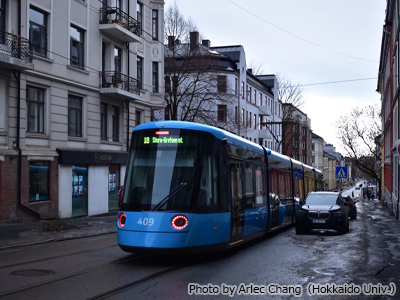
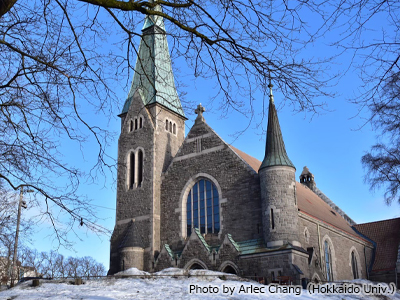
The glacier and ice sheet groups of the Hokkaido University and the University of Oslo have been conducting glacier research together. The collaborations include joint field observations in Svalbard, and holding exchange program for students from both sides to share expertise and research methods.
Travelling to Oslo City was a roughly 19-hour-flihgt from Sapporo. We departed from New Chitose and transferred in Istanbul before arriving at the destination. It was relatively warmer in Oslo compared to Sapporo, probably due to the influence of the North Atlantic Current. Therefore, not much snow was distributed in the city. The city was largely different from Sapporo City in the fact that the tram and the majority of vehicles are electric, and numerous architectures are made of rocks and bricks.
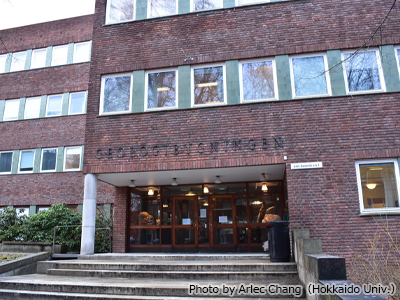
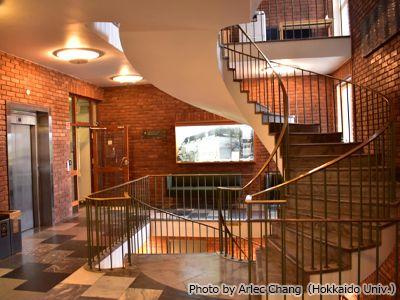
During our stay, we worked in a room designated for us in the Geoscience building. We were delighted to meet Professor Thomas Schuler on our very first day, and we were kindly introduced to most of the professors, postdoctoral students, and PhD students in his group. The research group we visited comprise researchers in the fields of glacier and ice sheets, permafrost, utilizing a variety of research methods, including satellite data analysis, field surveys, and modelling.
On the second day, we had an opportunity to give presentations on our work during the seminar, in the hope of informing people in the group about our research backgrounds, progress and current issues. It was a meaningful opportunity to receive feedbacks and we were looking forward to having more discussions with researchers and students there.
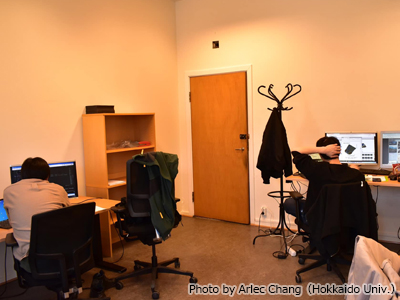
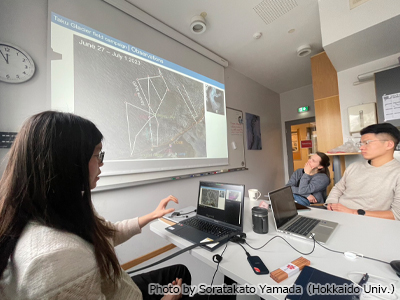
(2024/04/11)
Research visit at the University of Oslo
Writer:Ken Kondo (Hokkaido University)
Yefan Wang (Hokkaido University)
We are currently visiting a glacier research group at the University of Oslo as a part of the ArCS II International Research Exchange Program. We have been in Oslo for more than a month since January 9th, by seeing a gradual increase in daylight hours each day. We have ample opportunities to meet with world-renowned glaciologists, who are specialized in in-situ and remote sensing observation, and numerical modeling. We take such opportunities to introduce our ongoing glacier research and have lively discussions. The experts give us valuable comments and suggestions on our research methodology and result interpretations. In particular, I learned a great deal from Professor Thomas Schuler, the coordinator of the exchange program, who is specialized in glacier subglacial hydrology and mass balance. Dr. Ugo Nanni, a specialist of glacial seismicity, is also helping us a lot.
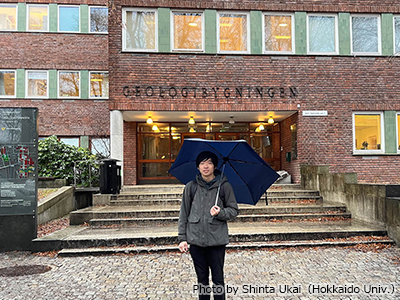
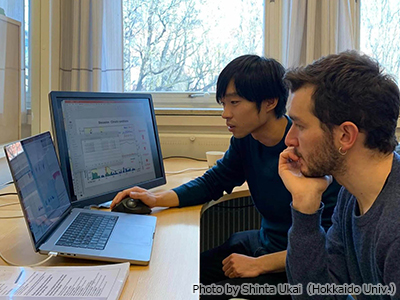
People in Oslo cherish the sunlight during winter because of the short daylight hours. On sunny holidays, the streets are bustling with people going out for cross-country skiing. It seems that enjoying nature in deeply snow-covered forests is a typical way to spend holidays here. Researchers here live by this same ethos, enjoying nature on their days off and focusing on research during the weekdays. Following the adage, “When in Rome, do as the Romans do,” we have also adapted to this approach, enjoy skiing on weekends.
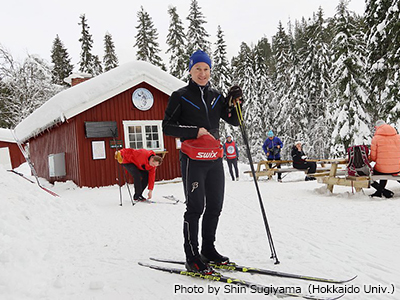
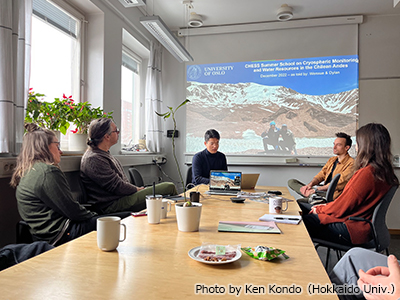
In the Section of Geography and Hydrology, where we are visiting, there are regular seminars on Tuesday and Friday at noon. Researchers and visitors introduce their studies or field observations in the seminar, where we have learned about a wide range of research from around the world by this chance. Furthermore, every Friday afternoon, there is a rotating “cake duty,” where researchers serve their homemade cakes and talk about the recent events and happenings over coffee before the weekend.
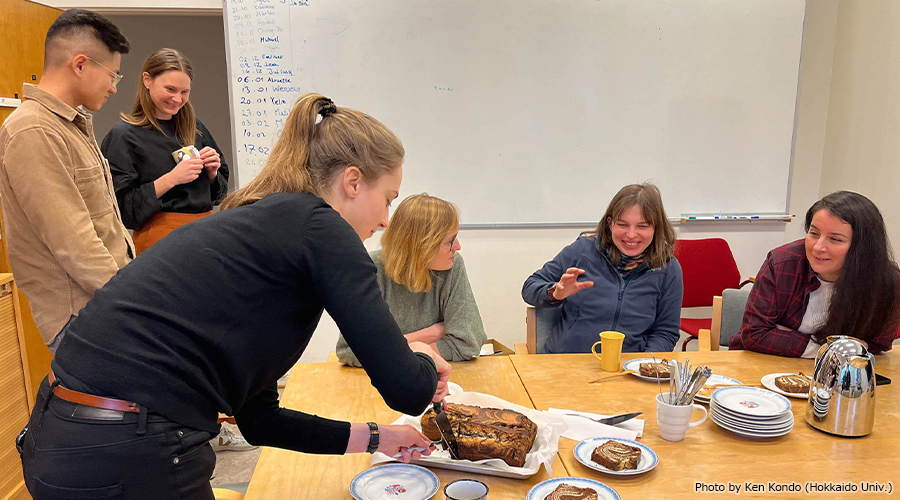
We have only one week left before leaving for Japan. I want to continue discussions with the researchers here until the very end of the visit and make every effort for new research results. I also intend to adapt the researchers’ lifestyle here into my daily life in Japan, which may lead to more efficient work in the future.
(2023/02/17)
Research workshop of ECRs at the University of Oslo
Writer:Shuntaro Hata (Hokkaido University)
Kaho Watanabe (Hokkaido University)
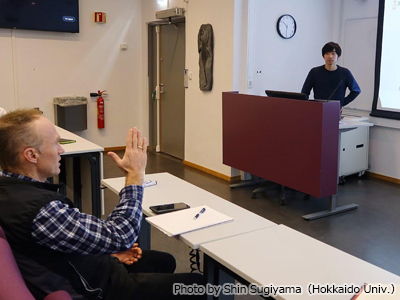
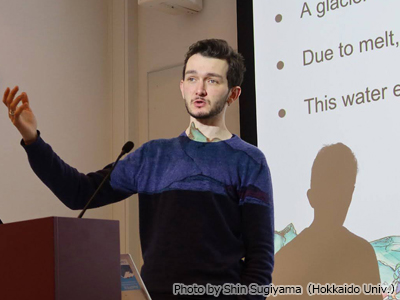
As a part of the ArCS II International Research Exchange Program, researchers and graduate students from Hokkaido University stayed in the Department of Geosciences, Oslo University in January – February 2023.
To exchange results and experiences of glacier research activities, we held a joint research seminar on 31st January. The seminar started with an introductory talk by Prof. Sugiyama about Hokkaido University and the ArCS II project. Then, four early career researchers and graduate students from Hokkaido University presented research in Greenland, Antarctica, and Patagonia. After a lunch break, Prof. Schuler introduced MAMMAMIA project which aims to reveal the mechanism of glacier acceleration in Svalbard. Thereafter, two participants from Oslo University presented field data from a glacier in Svalbard. A graduate student from Norwegian Polar Institute presented his study on glacial lakes in Antarctica.
The research topics presented in the seminar covered a wide range of research subjects (e.g. glacial lakes, glacier dynamics, glacier seismicity, mass balance) and research techniques (e.g. glacier monitoring, borehole measurements, satellite remote sensing). We had active discussions on differences and similarities in the results obtained in various regions and methods.
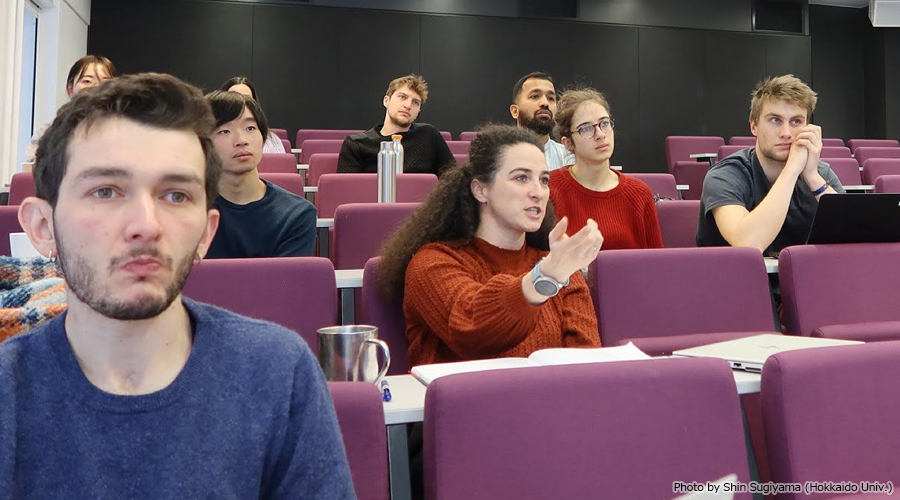
Discussions with oversea researchers were beneficial for the Japanese participants to introduce new ideas in our research activities. The exchange program provided all the participants with a great opportunity to exchange the latest study results each other. We will continue each research activity and meet again for further fruitful communication.
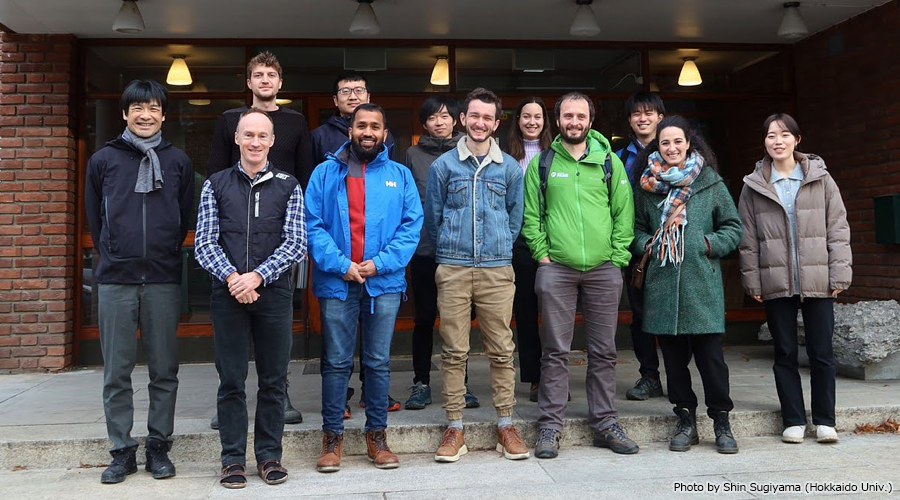
(2023/02/09)
Snow and ice field course in Moshiri, northern Hokkaido
Writer:Shin Sugiyama (Hokkaido University)
Two graduate students from the University of Oslo attended a snow and ice field course in Moshiri, northern Hokkaido, a region well known for heavy snow and cold temperature. This course has been organized by Hokkaido University since 2008. After three years of a break due to COVID-19, the program in 2023 was carried out with twenty graduate students from Hokkaido University and the University of Oslo.
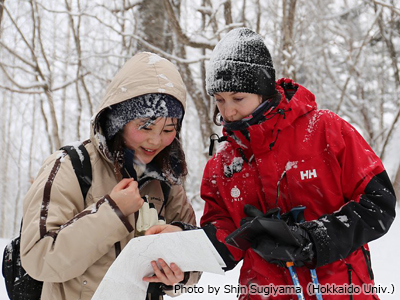
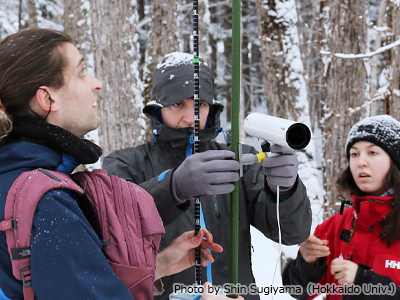
The four-day program began with air temperature measurements with devices distributed in the area. The students experienced temperatures below 20 degree C and learned the mechanism causing such a low temperature in this region. On the second day, the participants dug more than 1.5 meter-deep snow to survey snow layers. With help of lecturers, various devices were used to measure temperature, density, grain size and snow structures. On the next day, students went out to the forest to survey snow amount distributions. Snow depth and water equivalent were measured in the field along a forest path to investigate the spatial distribution of snow. Thanks to sunny conditions, all the participants enjoyed walking and working in a deeply snow-covered forest. The program was completed with presentations on the final day. Each of six groups analyzed data obtained during the course and performed oral presentations.
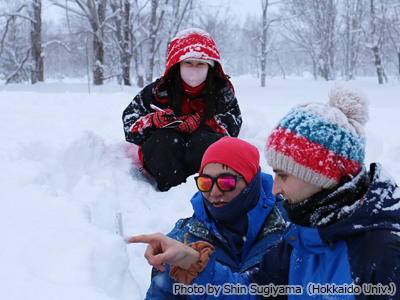
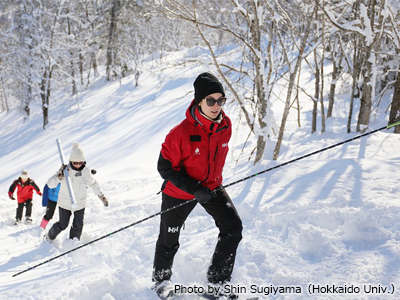
The extremely cold and snowy conditions in Moshiri provided a unique and valuable opportunity to learn processes governing climate change in the Arctic. In addition to the scientific activities, the international atmosphere of the course offered the participants experience of English communication and presentation.
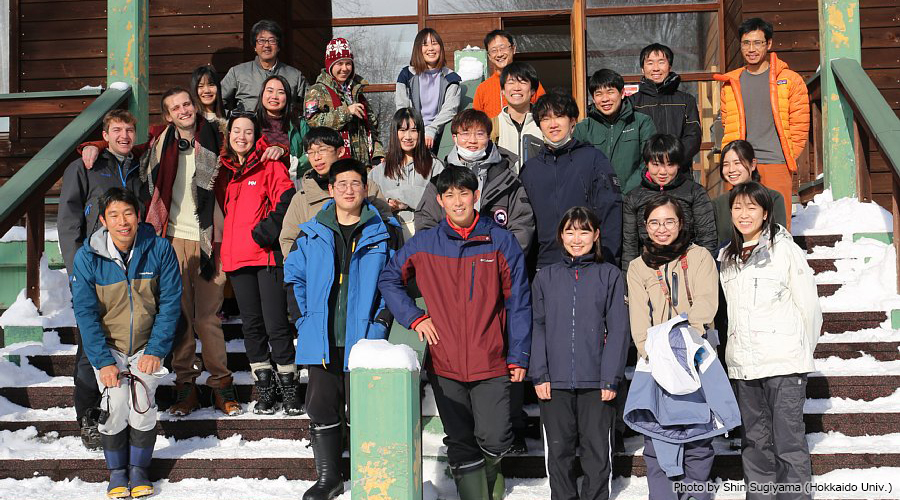
(2023/01/21)
Research workshop of ECRs from Hokkaido University and the University of Oslo
Writer:Shin Sugiyama (Hokkaido University)
Funded by the ArCS II International Research Exchange Program, Hokkaido University and the University of Oslo exchange researchers and graduate students for Arctic glacier and ice sheet research. From 10 to 24 January 2023, two graduate students of the University of Oslo stay at the Institute of Low Temperature Science, Hokkaido University.
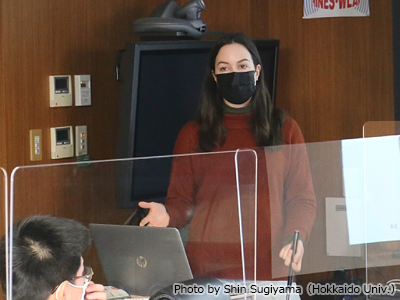
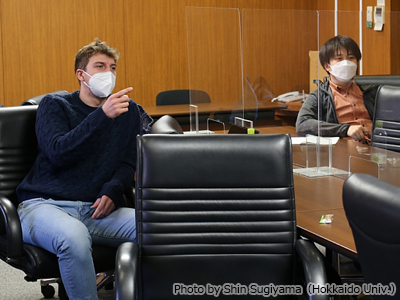
On 11 January, we organized a research seminar with researchers and graduate students from the two universities. The seminar began with an introductory talk by the program coordinator, Shin Sugiyama of Hokkaido University. The ArCS II Project and glacier/ice sheet research activity at Hokkaido University were introduced to the participants. The introduction was followed by presentations by the two graduate students from the University of Oslo, Satu Koroliina Innanen and Gabriele Bramati. Studies on mass balance and ice flow speed of glaciers in Svalbard were presented. The program continued with presentations by three graduate students from Hokkaido University. Recent data from Qaanaaq Ice Cap in Greenland were presented and discussed. The presentations and discussion covered a broad range of Arctic glacier research, from long-term glacier monitoring to satellite remote sensing.
The students from Oslo will attend a snow and ice field course in northern Hokkaido from 16 January. In January and February, early career researchers and graduate students of Hokkaido University stay at the University of Oslo for joint research activities.
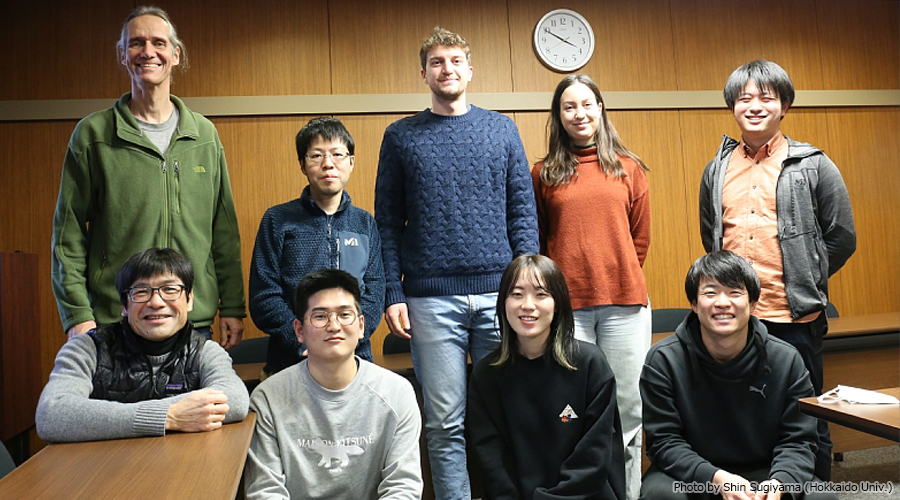
(2023/1/21)
